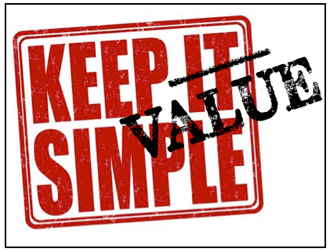Imagine this: You’re selling your company’s best product. You’ve successfully navigated the gatekeeper to speak with your target buyer (the person who will actually use your product) and have shared enough of a compelling message that they’re willing to engage with you. You figured out that they have the budget to buy your product and have proposed a solution you know will help your buyer achieve their goals. Everything is progressing wonderfully and then your primary point of contact goes…silent.

At the top of the financial pyramid where the CFO sits, there are tens – if not hundreds – of competing priorities for budget. And, while budget has already been assigned to different cost centers, a budget can be a moving target. For instance, if expenses start tracking higher or revenue is lower than forecast, budgets are often cut – even if the expense is to purchase something that generates revenue. CFOs don’t normally attend sales meetings, so what is the best way to make a compelling case without them in the room?
There is absolutely an emotional component to every sale, but that’s hard to do when one of your decision makers isn’t there to hear your presentation. You can – and should – convince your primary buyer that your solution will make their lives easier, improve their customer experience and/or improve customer loyalty while reducing any risk of making a change. But when it comes to convincing a CFO, however, you must also prove your financial value.
CFOs are usually pretty smart folks who have spent a career with numbers, stats and calculations, but instead of providing them with excruciating detail, our team has found the most success when keeping the conversation simple. The CFO doesn’t have enough time to attend your presentation; what makes you think he’ll have enough time (or interest) to walk through your spreadsheet?
 There’s another equally important reason to keep your case for financial value simple: your sales team. As a leader, you may be able to eloquently navigate through a detailed discussion of your return-on-investment, but your salespeople probably can’t. They don’t have the same financial model background and context you do and they’re typically responsible for selling multiple products. When salespeople don’t understand a complex topic, one of two things happen: they either botch the presentation or they’re not comfortable enough to have the conversation in the first place (or as a third possible outcome, they botch their first presentation and swear to never do it again). Likewise, it will be much easier for your primary buyer (who already believes in your solution) to communicate its merits in meetings you don’t attend if the explanation isn’t overly complicated. Simplicity will enable your client champion to have hard conversations on your behalf.
There’s another equally important reason to keep your case for financial value simple: your sales team. As a leader, you may be able to eloquently navigate through a detailed discussion of your return-on-investment, but your salespeople probably can’t. They don’t have the same financial model background and context you do and they’re typically responsible for selling multiple products. When salespeople don’t understand a complex topic, one of two things happen: they either botch the presentation or they’re not comfortable enough to have the conversation in the first place (or as a third possible outcome, they botch their first presentation and swear to never do it again). Likewise, it will be much easier for your primary buyer (who already believes in your solution) to communicate its merits in meetings you don’t attend if the explanation isn’t overly complicated. Simplicity will enable your client champion to have hard conversations on your behalf.
By offering a simple rationale for why your solution is more valuable than the competition’s and the status quo, your salespeople will be able clearly articulate it in a way that will resonate with the CFO. Then, when your primary buyer is looking for final approval, the CFO will sign off on the expenditure with confidence.
You’re doing all the right things to navigate the gatekeeper, engage your primary buyer and get her excited about your solution. Don’t stop there and hope your prospect purchases your product! Instead, take the extra step to prove your financial value ... simply. You’ll enable your sales team and your client champion while giving your client’s CFO the comfort he or she needs to sign off on the deal.
Want to keep reading about properly articulating your value and using simple tradeoffs to align price and value? Click below for a relevant article you can apply today.

.jpg)
